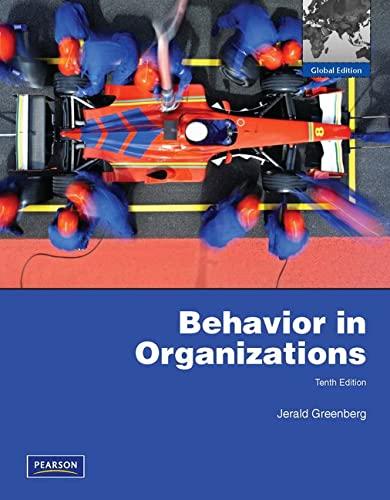Two brothers who have both run major companies? Thats certainly a rarity in the modern world of
Question:
Two brothers who have both run major companies? That’s certainly a rarity in the modern world of business. But it is exactly the situation for the Smith brothers, John F. and Michael. John is vice president of Corporate Planning and Alliances at General Motors, while his brother Mike is retired CEO of Hughes Electronics Corp. and serves on the boards of directors of several large electronics companies. So both have held powerful positions, indeed. But how, you may be wondering, did they both acquire so much power—and such a high level of success? Was it because they lusted after power and focused their lives on attaining it? People who know them well would disagree. They attribute the Smiths’ rise to power more to their interests than to any powerful desire for power.
Long-time friends and acquaintances note that even as children, the Smith brothers showed tremendous interest in business. Sally Mahoney, who knew the Smith brothers and their parents, recalls that as children, they loved to play board games, especially Monopoly. “I can just remember them stacking up those hotels and houses. Money was always very interesting to them,” she notes. And the Smiths themselves were aware of this interest from childhood on. “We like business. We grew up in a businessoriented family,” Mike says.
Although they attended different schools, the Smith brothers were both described by people who knew them as bright, hard-working, and unassuming. “Ego doesn’t show,” says M. Hoglund, a retired GM executive who worked with both brothers. “They are great guys to work around and as a result, generate a lot of loyalty.” “Jack will wander down the halls, his head down, trying to be obscure, where the king would be looking around for recognition,” says Dr. David E. Cole, director of the University of Michigan’s Center for Automotive Research.
So, it does not appear that the Smiths gained their power through organizational politics. Instead, they seemed to acquire it naturally because other people liked, trusted, and respected them.
In addition, the fact that they were “organizationoriented”
rather than “my own career–oriented” seems to have played an important role in their rise to power. Both Smith brothers are true team players, with genuine concern for the people with whom they work as well as their companies.
More top executives prefer to gather power from their personal characteristics—their charisma, expertise, personalities—than from their positions. The Smith brothers seem to appreciate this fact and have used it to build their successful careers—along with huge helpings of power. Individually and together, they suggest that the road to power in today’s organizations does not have to follow a route dictated by selfish self-interest. On the contrary, individuals who gain power often seem to do so because their skills and talents suit them to this role rather than because they set out, early in life, to seek it.
Questions for Discussion
1. What bases of personal power contribute to the Smith brothers’ success?
2. Is their low-key, unassuming approach the best for obtaining—and keeping—power?
3. How might organizational politics have played a role in the Smith brothers’ rise to the top?
Step by Step Answer:






